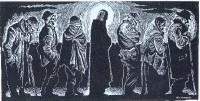

Karen House Catholic Worker
 |
Karen House Catholic Worker |
The RoundTable Community Summer 1993 Major Articles
|
Download Entire Issue by Clicking Image Above |
|||
Karen House: 1840 Hogan St. Saint Louis, MO 63106 Contact Us: 314.621.4052 |
Regular Features
|
Why This Issue: At last it has become common if not fashionable to bemoan the death of community in our life in the United States. From Robert Bellah to Scott Peck the need for community as felt by the ordinary citizen has become widely recognized. Ironically, even self-help mass market paperbacks proclaim our neglect of this intrinsic human quality.
This need for community cuts across the grain, in large part, of the heritage from which this nation developed. Although there are notable and persistent exceptions, individualism became the hallmark of the American personality. Today each of us must have our own car, home, career, appliances, etc., and the unfettered freedom to acquire and control them. What we are left with to share in common is little more than shopping, spectator sports, and television.
Now, however, there is a resurgent recognition of the hollowness of a life lived alone---not simply physically, but spiritually alone. There is a growing awareness of the need to live in conjunction with others with ties that bind, at some personal sacrifice, in order to achieve common goals and meet common needs. Community is at the heart of Christian life, although this has often been lost in our cultural milieu. Fellowship, the building up of the Body of Christ, compassionate care and involvement with each other, the discovery that we 'are not saved alone but only in conjunction with others -all of these are intrinsic to an authentic life of discipleship. The task of building and sustaining community is not easy nor always rewarding, as the lead article suggests. John Kavanaugh turns to a favorite passage of Dorothy Day's from The Brothers Karamazov to allow us to see the hardships and rewards of real community. This Catholic Worker perspective is underscored by a series of excerpts from Dorothy Day later in the issue. The theme is further examined as six individuals with widely varying personal histories come together to compare their experiences of community in a heartfelt discussion. Mary Dutcher reflects on the interconnections between a parish in Nicaragua and people of St. Louis, and how a sense of community has been built across the hemisphere. Sadly and ironically, it is also in this issue that the Karen House article fell to Jim and Katrina, who have chosen, with some anguish, to leave the St, Louis Catholic Worker community to become part of a rural farm community in far-off Washington. Mary Ann McGivern's thoughts from Little House and the Round Table Talk conclude the issue.
We trust that you can combine these reflections with the experiences of your own struggle with community so as to result in a more realistic but more passionate yearning for relationship with others in community. - Bill Miller |
The RoundTable is 24 pages long. To download, you'll need the most recent version of Adobe Acrobat. Download Adobe Acrobat 8 here (it's easy AND free!)
Search all of the RoundTable issues for an author, subject or title here: |